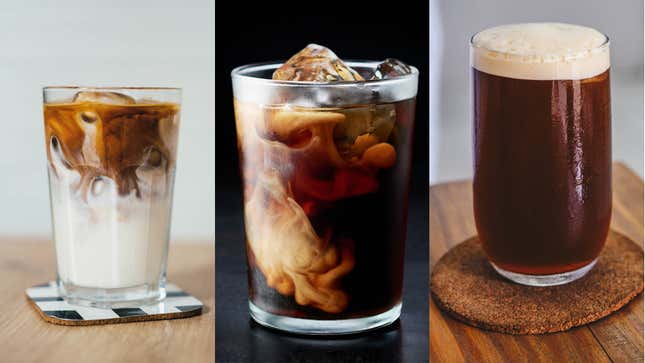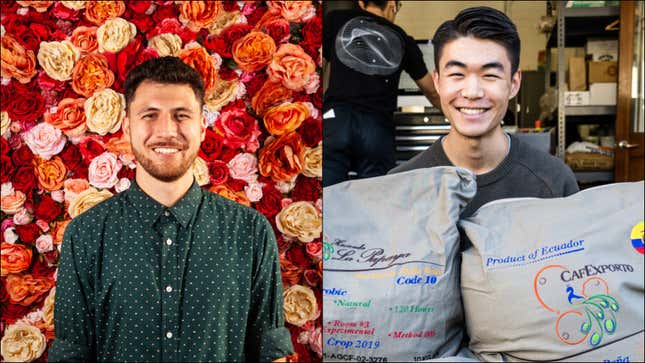
When there’s a mile-long line of thirsty, uncaffeinated people behind you, soul-searching coffeeshop questions are probably not the best idea. Still, warmer weather brings changes not just to your own drink selections, but to the coffee vocabulary you need to understand to expand your drink options just a little bit.
I spoke to two coffee experts, Elika Liftee, reigning U.S. Brewers Cup champion and coffee trainer at Arkansas-based Onyx Coffee Lab, and Kay Cheon, who manages wholesale & education at Dune Coffee Roasters in Santa Barbara, California, and asked them to answer some of the most pressing cold coffee questions you may have.

The Takeout: I want to break out my white clothes and my coffee drinks. When is the official start of cool coffee drink season?
Elika Liftee: The shift lines up pretty well with the end of high school. Around May, when it starts getting consistently over 70 degrees here in Arkansas, we see fewer hot coffee drinkers, and our younger customers increase their iced latte consumption.
TO: I’m still drinking hot coffee, but my friends laugh at me because it’s so hot outside. I’m feeling peer pressure to ice it up with the cool kids.
Kay Cheon: I think coffee habits are deeply personal, so there are people who will opt for a hot coffee during the summer, just as there are folks that will go for iced lattes when we’re all wearing down jackets. That being said, iced versions of drinks like vanilla lattes definitely do spike up during the summer.
TO: I know I ask this every time, but can you explain the differences between iced coffee, cold brew and nitro? I’m going to take notes and I’ll be ready for a pop quiz, I swear.
EL: Iced coffee is brewed hot and then chilled in about the same amount of time to make a regular cup or pot. This can be done in any number of ways and generally results in a brighter and sweeter cup of cold coffee, a favorite of home brewing enthusiasts and industry professionals.
KC: I associate iced coffee with hot coffee that has been made cold and then is served over ice, whether that be a flash brew or snapchilling or even putting hot coffee in the fridge.
EL: Cold brew is brewed with room temperature or cold water and takes anywhere from six to 24 hours. These cups have had longer exposure and are usually stronger, with smooth textures and more muddled flavor. These are popular, especially for people trying to watch their sugar and milk intake.
KC: Cold brew is coffee brewed with a lower water temperature, altering the flavor profile, but it has also, for many people, become fairly synonymous with iced coffee.
EL: Nitro is a term used for infusing either an iced coffee or cold brew with nitrogen gas. The tiny bubbles don’t burn or tickle like carbonation; instead they make drinks velvety, resulting in a smooth and creamy texture added to the coffee without any extra calories or sugar.
TO: Is cold brew better for me?
EL: I encounter a lot of confusion about cold brew and whether or not it has less acidity than hot coffee. While it has been popular belief that cold brew is less acidic, the fact is that it has the same acidity as a comparable hot coffee, but due to temperature, we perceive it less.
TO: Does cold brew have more caffeine?
KC: Similar to espresso, it really depends on how much coffee was used to brew, rather than generalizing over the entire brew method.
TO: I think my barista hates me because sometimes my coffee tastes like acid. In a world where nothing is normal, is this acid in coffee normal?
EL: It’s important to understand from a health perspective that there is negligible difference in acidity in a cup of coffee. However, from a flavor perspective, we have various ways of influencing our perception of acidity. Coffees that have more body, are older, or are served colder will have less perceived acidity than other cups, so we don’t taste it as much even if it’s still there.
TO: I want to hop on the bus to Trendy Town ahead of all my chums and sip the newest, best coffee drinks. What’s on the horizon, oh great barista futurologists?
KC: I’m waiting for a company like White Claw to release a seasonal coffee seltzer. It should be any day now.
TO: I think we’ve really bonded here. I want to drink what you drink, so please spill the—well, coffee.
EL: I’ll whip up an iced coffee as a pour-over every once in a while, even if I still drink my share of hot coffee. I also really enjoy a Shakerato, which is espresso and simple syrup—I enjoy honey, or floral syrups—shaken until frothy and poured over ice. It’s refreshing, simple, and very enjoyable.
KC: I’m probably still drinking hot coffee in the summer, but if I’m drinking something cold, I’ll usually lean towards something a little less concentrated and more refreshing. My coworker Alex here at Dune has been R&Ding a tonic recipe that’s tasting lovely, something like an espresso tonic. The first coffee shop I worked at Demitasse in Los Angeles has a drink called the Iced Minty Cubano, made with mint syrup and a milky cold brew blend, and I still think about that one sometimes.